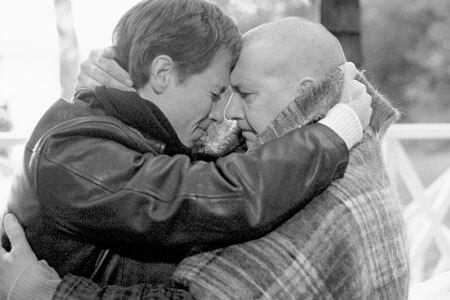Friends and family reunite to comfort a terminally ill, not-so-old soul
Rémy is an unapologetic, libertine socialist. Sébastien, his estranged son, is a technocratic capitalist. Can they find common ground in a time of crisis?
That’s the central dilemma that propels the new French-Canadian film “The Barbarian Invasions,” a heart-tugging crowd-pleaser at the 2003 Cannes Film Festival.
In less capable hands, such a sitcom-esque premise might make for a saccharine, tedious enterprise. But Denys Arcand, Canada’s most acclaimed writer/ director, manages to infuse the material with rare warmth and textured panache, turning out a tender meditation on the myriad wild forces that make life wondrous… and frustrating.
“Barbarian Invasions” is actually a sequel of sorts, reuniting characters, and many of the same actors, from Arcand’s phenomenal 1986 film, “The Decline of the American Empire.” A lot of water has gushed under the bridge in the 17 years since these idealistic, sexually liberated friends loved and laughed together. Somehow, they’ve managed to mature and regress at the same time, much to our amusement.
The film opens in the overburdened government hospital in Quebec where Rémy has landed. Morose patients on gurneys pack the halls. Webs of electric cords hemorrhage from the disheveled dropped ceilings.
Only 51, the cantankerously passionate Rémy (played to snarky perfection by Rémy Girard) is too young to die and he knows it. He wrestles with the meaning of his life with convoluted recrimination,
“I’m a total failure,” he laments.
Until his inoperative cancer diagnosis, Rémy was an under-appreciated professor in a middling university in Montreal. He cheated on his wife just six months after their wedding, divorcing soon after. Sébastien barely speaks to him.
Memories of moist dreams with ravishingly sexy female stars, like Julie Christie and Chris Everett (why not?), make him wistful for days long gone.
“It’s been years since I humped a co-ed,” bemoans Rémy.
At first, we are led to believe that Rémy is a lousy father and Sébastien (Stéphane Rousseau) an ungrateful son. Referring to his mother, Sébastien barks, “I’m here for her, not you!”
As the story blossoms, a different picture emerges. Sébastien has traveled all the way from London, with fiancée in tow, to fulfill his filial obligation, conducting his financial risk management business from his cell phone and laptop computer while tending to his father’s considerable needs. Rémy’s absentee daughter, who takes after her free-spirited father, is on a sailing trip somewhere in the Pacific.
Sébastien deftly bribes a by-the-book hospital administrator and the hospital union to renovate a room—a suite of rooms, actually—on a vacant floor. Money is no object.
With the aid of Nathalie, daughter of one of Rémy’s countless former mistresses, Sébastien procures heroin to calm his father’s pain, which the doctor claims is 800 percent more effective than methadone. (Apparently, OxyContin is not available in Canada.) Dressed in a crisp navy blue suit and tie, Sébastien is the personification of results-oriented efficiency. As the movie progresses, his style of dress relaxes as his heart softens.
Most therapeutic of all, Sébastien assembles a motley group who had loved his father in the past and wish to show they love him still. One chum is now married to a busty shrew with two angelic daughters. There is a middle-aged gay male couple who live a cushy life in Rome and cook a mean Tuscan salmon. Even Rémy’s ex-wife Louise (Dorothée Berryman) joins the merry band.
Just like the old days, the crew throws wine and cheese parties—now in Rémy’s private hospital digs—jovially squabbling about politics, history and ideology, with lots of frank talk about blow jobs and such to spice things up. They joke about all the “isms” they once embraced: existentialism, structuralism, Marxism, feminism. Though Rémy relishes the bonhomie, his worn out body won’t allow him to partake in the wine or fresh truffles.
As Rémy’s condition worsens, the group adjourns to his favorite lakeside cabin to continue reminiscing. The shot of Rémy in a wheelchair, alone at the end of a tiny wooden pier, measuring the beauty of the lake and his less-than-satisfying life, is ruefully heartbreaking. It’s all the more poignant when the camera cuts to him sucking heroin fumes with a makeshift aluminum foil pipe, desperate to blunt the latest wave of pain.
Marie-Josée Croze, who won the Best Actress award at Cannes for her portrayal of the model-beautiful, drug-addled Nathalie, underplays her too-brief role with unexpected grace. When she advises Sébastien to “never trust a junkie,” it’s a safe bet that later in the film we will cruelly be shown exactly why.
A few missteps prevent “The Barbarian Invasions” from being a great film. At times, the plot contrivances—securing a secret lavish hospital room, people putting their frenzied lives on indefinite hold to hang out with a dying man—undermine the story’s earnest credibility. The doctors get Rémy’s name wrong one too many times. When Nathalie impetuously chucks Sébastien’s cell phone into the fire, he laughs it off, when, by all rights, he should wring her pretty, young neck.
The film’s title refers to any or all of a host of evil influences that threaten to poison humankind. Drugs. Disease. Greedy labor unions. Inanely bloated healthcare systems. The decline of the Roman Catholic Church. Crass American culture tightening its grip on a docile Canadian neighbor. The terrorist attacks on America on 9/11. (An unfortunate shocking visual reference to the attacks comes across as wantonly exploitative.) And yes, even a materialistic financier son.
Waves of barbarian invasions have washed over so-called civilizations from the beginning of time. As this touching film not so gently reminds us, with love, wit, and a dash of irony, we can survive any invasion, barbaric or otherwise.



































